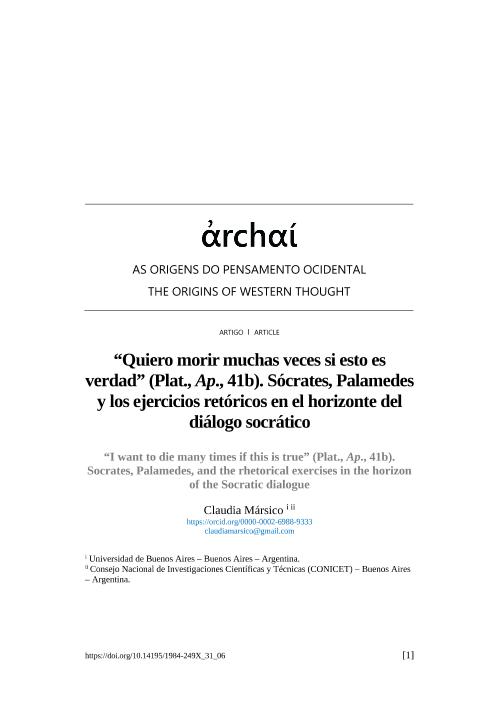Mostrar el registro sencillo del ítem
dc.contributor.author
Mársico, Claudia Teresa

dc.date.available
2021-08-06T15:14:49Z
dc.date.issued
2021-06-12
dc.identifier.citation
Mársico, Claudia Teresa; "Quiero morir muchas veces si esto es verdad" (Plat., Ap., 41b): Sócrates, Palamedes y los ejercicios retóricos en el horizonte del diálogo socrático; Universidade de Brasília; Archai; 31; 12-6-2021; 1-19
dc.identifier.issn
2179-4960
dc.identifier.uri
http://hdl.handle.net/11336/137957
dc.description.abstract
La figura de Sócrates separa la historia del pensamiento en dos e inaugura un modelo de filosofía que impactó en toda la tradición posterior con la sola fuerza de su influjo y el halo totémico de su muerte trágica. No faltaronrelatos de lo acaecido, pero entre ellos ninguno opaca a la Apología de Sócrates de Platón como texto fundamental para adentrarse en los pormenores del juicio y la condena. En este contexto poco suele tenerse en cuenta que se trata de un texto transido deopacidad. Parece un documento testimonial, una versión cuasi taquigráfica del proceso, pero no lo es. En efecto, nos interesa referirnos especialmente a un hecho que ha sido notado pero no del todo dimensionado: la Apología de Sócrates de Platón presenta similitudes imposibles de atribuir a la mera casualidad con la Apología de Palamedes de Gorgias. ¿Por qué este texto platónico presenta curiosas relaciones intertextuales con un ejercicio retórico basado en figuras míticas en el clima de la promoción de laretórica? Trataremos de responder esa pregunta apelando a su relación con el origen del diálogo socrático.
dc.description.abstract
The figure of Socrates divides the history of Western thought into two parts.It inaugurates a model of philosophy that shaped all subsequent tradition with the sole force of its influence and the totemic aura from his tragic death. There were many accounts of what happened, but none of them overshadowed Plato's Apology of Socratesas a fundamental text for entering into the details of the trial and sentence. In this context, the opacity of this text is rarely taken into account. It seems to be a testimonial document, a quasi-stenographic version of the process, but it is not. In fact, we are interested in referring to a fact that has been noted but not entirely dimensioned: Plato's Apology of Socratespresents similarities impossible to attribute to mere chance with Gorgias’ Apology of Palamedes. Why does this Platonic text present curious intertextual relationships with a rhetorical exercise based on mythical figures in the climate of the promotion of rhetoric? We will try to answer this question appealing to its link with the origin of the Socratic dialogue.
dc.format
application/pdf
dc.language.iso
spa
dc.publisher
Universidade de Brasília
dc.rights
info:eu-repo/semantics/openAccess
dc.rights.uri
https://creativecommons.org/licenses/by/2.5/ar/
dc.subject
SÓCRATES
dc.subject
APOLOGÍA
dc.subject
GORGIAS
dc.subject
PLATÓN
dc.subject
GÉNERO
dc.subject.classification
Filosofía, Historia y Filosofía de la Ciencia y la Tecnología

dc.subject.classification
Filosofía, Ética y Religión

dc.subject.classification
HUMANIDADES

dc.title
"Quiero morir muchas veces si esto es verdad" (Plat., Ap., 41b): Sócrates, Palamedes y los ejercicios retóricos en el horizonte del diálogo socrático
dc.title
"I want to die many times if this is true" (Plat., Ap., 41b): Socrates, Palamedes, and the rhetorical exercises in the horizon of the Socratic dialogue
dc.type
info:eu-repo/semantics/article
dc.type
info:ar-repo/semantics/artículo
dc.type
info:eu-repo/semantics/publishedVersion
dc.date.updated
2021-07-29T18:24:44Z
dc.identifier.eissn
1984-249X
dc.journal.number
31
dc.journal.pagination
1-19
dc.journal.pais
Brasil

dc.journal.ciudad
Brasilia
dc.description.fil
Fil: Mársico, Claudia Teresa. Universidad de Buenos Aires; Argentina. Consejo Nacional de Investigaciones Científicas y Técnicas; Argentina
dc.journal.title
Archai
dc.relation.alternativeid
info:eu-repo/semantics/altIdentifier/doi/http://dx.doi.org/10.14195/1984-249X_31_06
dc.relation.alternativeid
info:eu-repo/semantics/altIdentifier/url/https://impactum-journals.uc.pt/archai/article/view/8328
Archivos asociados
